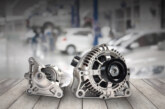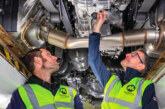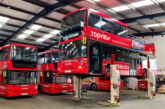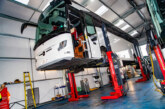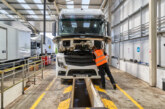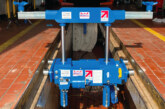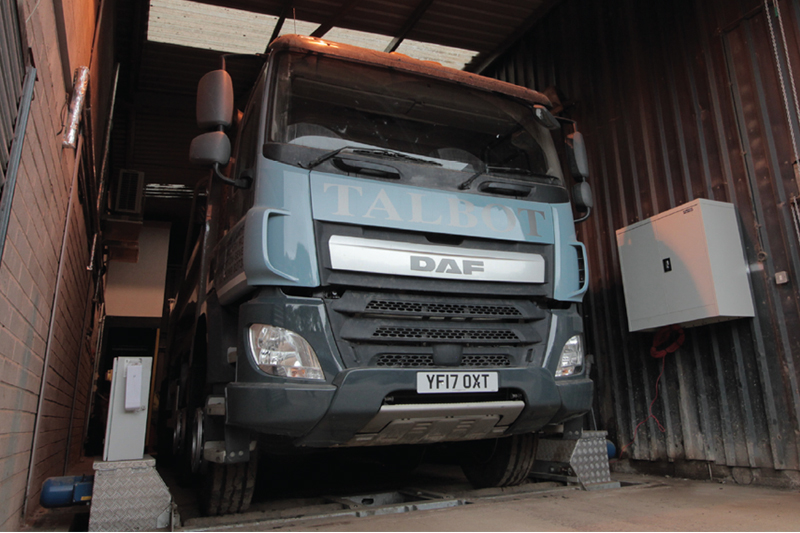
Brake testing is of vital importance to ensure that fleets are operating as safely as possible. TotalKare has developed its brake testing equipment to service this exact requirement. Two beneficiaries, D E Talbot and Highland Council, detail their experiences with the equipment.
D E Talbot
Family-run business D E Talbot offers transport, recycling, and landfill services across Worcestershire, aiming to reduce the rate of aggregates and soils ending up in landfill sites unnecessarily.
With a fleet of heavy duty vehicles to regularly maintain, the outsourcing of brake testing became unprofitable for the business. D E Talbot had previously been maintaining its vehicles using TotalKare’s SVL mobile column lifts for many years, so turned to the company again for support with sourcing its new brake tester. D E Talbot was seeking a permanent installation, but space and logistical limitations made an in-ground model unviable. Instead, a bespoke solution that involved ground-recessing a mobile brake tester was delivered.
George Georgiou, Area Sales Manager at TotalKare, explains: “This customer had a specific and unique requirement for their brake tester. Combining elements of our in-ground and mobile brake testers, we were able to identify a bespoke solution. We created a recessed area within which to install a custom-fit mobile unit. This solution provides D E Talbot with the fixed and permanent set up of an in-ground model, combined with the compact and non-disruptive design of the mobile brake tester.”
Supplied with a tablet that enables brake tests to be conducted from the comfort of the driver’s seat, TotalKare’s mobile and in-ground brake testers can test up to 20,000kg per axle and can be customised with tachograph calibration, load simulation, and play detection.
With 7,000kg safe working load per column, D E Talbot’s set of mobile column lifts provide reliable heavy duty lifting for the busy workshop. The SVL lifts are one of the older model’s in TotalKare’s range and can be purchased pre-owned and fully refurbished by skilled TotalKare engineers. In comparison, the company’s latest mobile column lifts provide 7,500kg lifting capacity per column, with cabled, cable-free, and galvanised wash bay versions available.
D E Talbot’s equipment is supported through a TotalKare ‘Afterkare’ service plan, which includes regular service and calibration visits.
Bob Talbot, Director at D E Talbot, comments: “We recognised a need to bring our brake testing in-house, but had certain requirements which rendered any ‘out of the box’ solution unsuitable. TotalKare has helped us to establish the ideal piece of equipment, allowing us to continue our important efforts across the county in a timely and efficient way.”
Highland Council
Highland Council operates a large fleet of vehicles which are vital in supporting local infrastructure, from waste and recycling vehicles to road sweepers, gritter trucks, snow ploughs, and public transport.
In response to increased testing requirements, the Council identified a requirement to bring its brake testing in-house and lease purchased two mobile brake testers from TotalKare at two separate sites in the summer of 2019.
Impressed with the immediate time and cost savings associated with not having to visit an external test centre, Highland Council returned to TotalKare earlier this year to lease purchase an additional mobile brake tester and two in-ground brake testers, each to be installed at three further sites. All five of Highland Council’s brake testers feature bidirectional rollers and the mobile brake testers were also supplied with extended on ramps – perfect for longer vehicles.
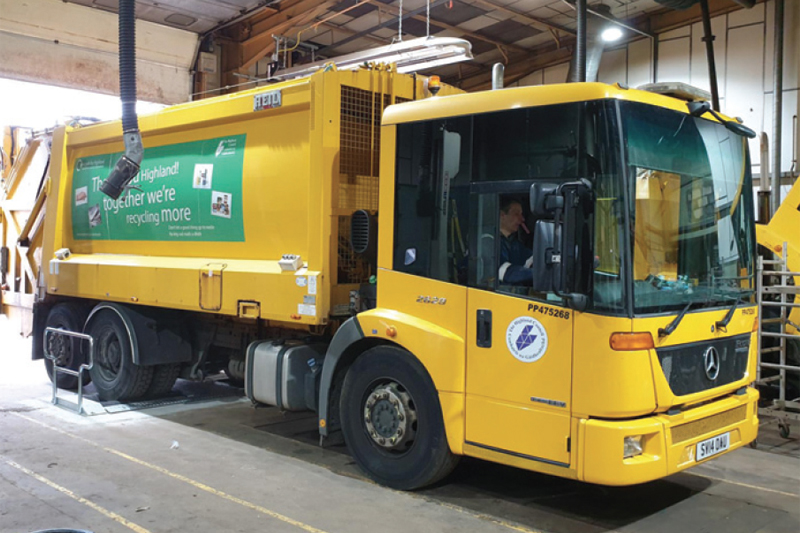
“Ensuring our entire vehicle fleet remains roadworthy, thus ensuring their safety and that of the public, is of the upmost importance,” explains Mike Cooper, Transport & Logistics Manager at Highland Council. “Having the ability to test in-house not only saves us the time it would take to drive each vehicle to a test centre, but over time the capital investment will save the Council a significant amount of taxpayer money which can be diverted to other areas.”
Each brake tester will be supported through a TotalKare ‘Afterkare’ service plan, which includes two service and calibration visits per year per brake tester.
Jack Longstaff, Area Sales Manager for TotalKare, states: “Highland Council recognises the value of brake testing its vehicles in-house and it has reduced the impact of the capital investment by taking advantage of flexible finance options provided by TotalKare. We are pleased to offer ongoing support and look forward to extending our relationship with the Council further in the future.”
TotalKare launches brake test savings calculator
TotalKare’s brake test calculator can help you to quickly understand whether the investment of an in-house brake tester may provide a saving in the long term.
Cost savings
Depending on the size of your fleet, the cost of routine brake testing each vehicle soon adds up. Investing in an in-house brake tester eradicates those costs, and you might be surprised at how quickly you can break even too.
Brake testing in-house removes the cost of the test itself. And remember, if a vehicle fails its test at an external testing centre, it costs you again to re-test it. By not having to drive to and from a test centre for a brake test, you’ll not only save time, but you’ll also save fuel – and we all know how much that costs! Simply enter your fleet size and number of tests per year into the calculator, and see how soon you could be saving for your business.
Time savings
Don’t forget to consider the monetary value of your time savings. Let’s say you currently outsource the brake testing of your fleet. Every time a vehicle is taken to be tested, the vehicle and the driver are both unavailable to you. The time taken to drive the vehicle to a test centre is time the vehicle and driver could be on the road adding value to your business. Conducting brake tests in-house means neither the vehicle or its driver are spending time driving to and from the test centre, so they can be back out on the road earning you money sooner. In the case of some of TotalKare’s customers, this is as much as 90 minutes in each direction – a long time for the vehicle and driver to be out of commission!

